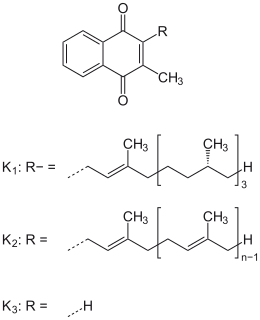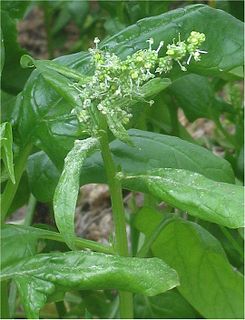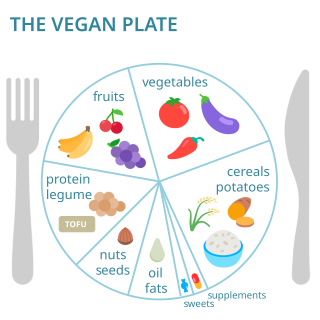A vitamin is an organic compound and a vital nutrient that an organism requires in limited amounts.
Vitamin may also refer to:
A vitamin is an organic compound and a vital nutrient that an organism requires in limited amounts.
Vitamin may also refer to:

Rickets is a condition that results in weak or soft bones in children, and is caused by either dietary deficiency or genetic causes. Symptoms include bowed legs, stunted growth, bone pain, large forehead, and trouble sleeping. Complications may include bone deformities, bone pseudofractures and fractures, muscle spasms, or an abnormally curved spine.

Vitamin C is a water-soluble vitamin found in citrus and other fruits and vegetables, and also sold as a dietary supplement. It is used to prevent and treat scurvy. Vitamin C is an essential nutrient involved in the repair of tissue, the formation of collagen, and the enzymatic production of certain neurotransmitters. It is required for the functioning of several enzymes and is important for immune system function. It also functions as an antioxidant. Most animals are able to synthesize their own vitamin C. However, apes and monkeys, most bats, some rodents, and certain other animals must acquire it from dietary sources.

A vitamin is an organic molecule (or a set of molecules closely related chemically, i.e. vitamers) that is an essential micronutrient that an organism needs in small quantities for the proper functioning of its metabolism. Essential nutrients cannot be synthesized in the organism, either at all or not in sufficient quantities, and therefore must be obtained through the diet. Vitamin C can be synthesized by some species but not by others; it is not a vitamin in the first instance but is in the second. The term vitamin does not include the three other groups of essential nutrients: minerals, essential fatty acids, and essential amino acids. Most vitamins are not single molecules, but groups of related molecules called vitamers. For example, there are eight vitamers of vitamin E: four tocopherols and four tocotrienols. Some sources list fourteen vitamins, by including choline, but major health organizations list thirteen: vitamin A (as all-trans-retinol, all-trans-retinyl-esters, as well as all-trans-beta-carotene and other provitamin A carotenoids), vitamin B1 (thiamine), vitamin B2 (riboflavin), vitamin B3 (niacin), vitamin B5 (pantothenic acid), vitamin B6 (pyridoxine), vitamin B7 (biotin), vitamin B9 (folic acid or folate), vitamin B12 (cobalamins), vitamin C (ascorbic acid), vitamin D (calciferols), vitamin E (tocopherols and tocotrienols), and vitamin K (phylloquinone and menaquinones).

Vitamin K refers to structurally similar, fat-soluble vitamers found in foods and marketed as dietary supplements. The human body requires vitamin K for post-synthesis modification of certain proteins that are required for blood coagulation or for controlling binding of calcium in bones and other tissues. The complete synthesis involves final modification of these so-called "Gla proteins" by the enzyme gamma-glutamyl carboxylase that uses vitamin K as a cofactor.
Vitamin E is a group of eight fat soluble compounds that include four tocopherols and four tocotrienols. Vitamin E deficiency, which is rare and usually due to an underlying problem with digesting dietary fat rather than from a diet low in vitamin E, can cause nerve problems. Vitamin E is a fat-soluble antioxidant which may help protect cell membranes from reactive oxygen species.

Vitamin B6 is one of the B vitamins, and thus an essential nutrient. The term refers to a group of six chemically similar compounds, i.e., "vitamers", which can be interconverted in biological systems. Its active form, pyridoxal 5′-phosphate, serves as a coenzyme in more than 140 enzyme reactions in amino acid, glucose, and lipid metabolism.

Retinol, also called vitamin A1, is a fat-soluble vitamin in the vitamin A family found in food and used as a dietary supplement. As a supplement it is used to treat and prevent vitamin A deficiency, especially that which results in xerophthalmia. In regions where deficiency is common, a single large dose is recommended to those at high risk twice a year. It is also used to reduce the risk of complications in measles patients. It is taken by mouth or by injection into a muscle.

Spinach is a leafy green flowering plant native to central and western Asia. It is of the order Caryophyllales, family Amaranthaceae, subfamily Chenopodioideae. Its leaves are a common edible vegetable consumed either fresh, or after storage using preservation techniques by canning, freezing, or dehydration. It may be eaten cooked or raw, and the taste differs considerably; the high oxalate content may be reduced by steaming.
Vitamin S may refer to:
B vitamins are a class of water-soluble vitamins that play important roles in cell metabolism and synthesis of red blood cells. Though these vitamins share similar names (B1, B2, B3, etc.), they are chemically distinct compounds that often coexist in the same foods. In general, dietary supplements containing all eight are referred to as a vitamin B complex. Individual B vitamin supplements are referred to by the specific number or name of each vitamin, such as B1 for thiamine, B2 for riboflavin, and B3 for niacin. Some are more commonly recognized by name than by number, for example pantothenic acid, biotin, and folate.

Pernicious anemia is a type of vitamin B12 deficiency anemia, a disease in which not enough red blood cells are produced due to the malabsorption of vitamin B12. Malabsorption in pernicious anemia results from the lack or loss of intrinsic factor needed for the absorption of vitamin B12. Anemia is defined as a condition in which the blood has a lower than normal amount of red blood cells or hemoglobin. The disease may come on slowly and insidiously.
Swiss may refer to:

Vitamin String Quartet (VSQ) is an American musical group from Los Angeles, widely known for its series of tribute albums to rock and pop acts.

Vitamin B12, also known as cobalamin, is a water-soluble vitamin involved in metabolism. It is one of eight B vitamins. It is required by animals, which use it as a cofactor in DNA synthesis, in both fatty acid and amino acid metabolism. It is important in the normal functioning of the nervous system via its role in the synthesis of myelin, and in the circulatory system in the maturation of red blood cells in the bone marrow. Plants do not need cobalamin and carry out the reactions with enzymes that are not dependent on it.

Vitamin D is a group of fat-soluble secosteroids responsible for increasing intestinal absorption of calcium, magnesium, and phosphate, and many other biological effects. In humans, the most important compounds in this group are vitamin D3 (cholecalciferol) and vitamin D2 (ergocalciferol).

The ultraviolet radiation in sunlight has both positive and negative health effects, as it is required for the synthesis of vitamin D3 and is a mutagen. A dietary supplement can supply vitamin D without this mutagenic effect, but supplementation offers limited bioavailability and no synthesis of subdermal nitric oxide. Vitamin D has been suggested as having a wide range of positive health effects, which include strengthening bones and possibly inhibiting the growth of some cancers. UV exposure also has positive effects for endorphin levels, and possibly for protection against multiple sclerosis. Abundant visible light to the eyes gives health benefits through its association with the timing of melatonin synthesis, maintenance of normal and robust circadian rhythms, and reduced risk of seasonal affective disorder.

Vegan nutrition refers to the nutritional and human health aspects of vegan diets. A well-planned, balanced vegan diet is suitable to meet all recommendations for nutrients in every stage of human life. Vegan diets tend to be higher in dietary fiber, magnesium, folic acid, vitamin C, vitamin E, iron, and phytochemicals; and lower in calories, saturated fat, cholesterol, long-chain omega-3 fatty acids, vitamin D, calcium, zinc, and vitamin B12.

Mechouia salad is a Tunisian salad. A very popular first course dish from Tunisia, a country in North Africa that appreciates spiciness, it is especially consumed in the summer, and is a grilled vegetable, tomatoes, peppers, onions and garlic salad, that may also contain eggplant. They are grilled in the oven or on the stove and then ground together, spiced, and then tuna and olive oil are added, and sometimes boiled eggs are placed for decoration.

"Vitamin D" is a song by American rapper Ludacris featuring vocals from Ty Dolla Sign. It was released March 31, 2017 as the lead single from Ludacris's upcoming ninth studio album, set for release in 2018. The track was produced by Da Internz, Miykal Snoddy and GMF.
Niacin may refer to: